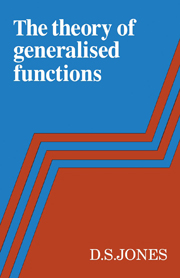Book contents
- Frontmatter
- Contents
- Preface
- 1 Convergence
- 2 Good functions
- 3 Generalised functions
- 4 Powers of x
- 5 Series
- 6 Multiplication and the convolution product
- 7 Several variables
- 8 Change of variables and related topics
- 9 Asymptotic behaviour of Fourier integrals
- 10 Some applications
- 11 Weak functions
- 12 The Laplace transform
- Table of Fourier transforms
- Table of Laplace transforms
- Index
- Frontmatter
- Contents
- Preface
- 1 Convergence
- 2 Good functions
- 3 Generalised functions
- 4 Powers of x
- 5 Series
- 6 Multiplication and the convolution product
- 7 Several variables
- 8 Change of variables and related topics
- 9 Asymptotic behaviour of Fourier integrals
- 10 Some applications
- 11 Weak functions
- 12 The Laplace transform
- Table of Fourier transforms
- Table of Laplace transforms
- Index
Summary
This chapter is concerned primarily with deriving certain theorems on convergence which will be required in subsequent chapters. It is expected that most readers will be familiar with the notions involved so that much of the material is given in a condensed manner. However, an attempt has been made to make the chapter self-contained. Some readers may find the chapter a helpful introduction to the ideas and terminology employed in other books on generalised functions. The reader who does not have a good background in analysis is strongly advised to go straight to Chapter 2 and to just refer to Chapter 1 for the theorems that are needed.
Preliminary definitions
A set is a collection of elements. A set containing no elements is called a null or empty set. There is no restriction on what an element is: it may be a number or a point or a vector and so on. Usually we shall call the elements points and take all sets to be sets of points in a fixed non-empty set Ω, which will be called a space. The empty set will be denoted by ∅ and the capitals A,B,… will denote sets. If ω is a point of A, we write ω∈A ; if ω is not a point of A, we write ω∉A.
- Type
- Chapter
- Information
- The Theory of Generalised Functions , pp. 1 - 43Publisher: Cambridge University PressPrint publication year: 1982



